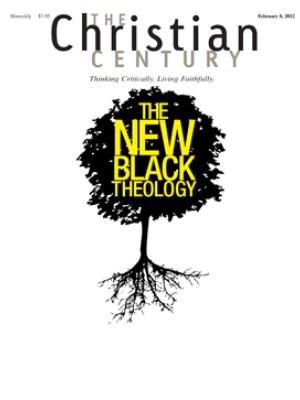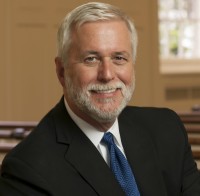The good sheepdog

I've learned a lot about being a pastor from Esau, our family's hairy sheepdog. The American Kennel Club calls him a bearded collie, but that's misleading since he looks nothing like Lassie. He's actually a Scottish version of the Old English sheepdog, which I believe makes him a Presbyterian.
I have always been uneasy with thinking of myself as the shepherd of our congregation. That role belongs to Jesus Christ. I've learned that it's far more helpful to think of myself as a sheepdog that nudges sheep toward the only Savior of the flock.
Read our latest issue or browse back issues.
My favorite household chore is to take Esau around the block for his morning walk. We do this as liturgy. As we shuffle along, both of us are waking up to the new day that has come as a grace from God. Typically, Esau reminds me to greet the day with excitement.
Without fail at some point in the walk he will stop, stand very still, lift his nose high into the air, and get a sniff of something that excites him so much that his tail has to wag. I have no idea what he is sensing, but every morning when we go through this routine I wish I had his nose to receive what I cannot. And I envy his tail that is always eager to express praise for what is lying around out there in creation.
Part of my call as the pastor of a local congregation is to sense the goodness of what is around us, even if a parishioner in a hospital bed cannot. This doesn't mean that I am unaware of the dangers, hurts and grief that also abound. Neither is Esau. He senses the arrival of a thunderstorm long before anyone else in the house and typically runs for the sanctuary of his crate in the family room. As a pastor, it is my job to understand the anxiety that propels our people to gather together at church every Sunday morning in hopes of finding sanctuary from the storms of life. But I'm also called to wag with excitement over the discovery that God's grace is always in the air.
Anyone can leave the sanctuary and get a whiff of this, but you have to pay attention. And that's just another reason why we come to worship in a place where our spiritual senses are sharpened.
When Esau and I walk around the block we often encounter another dog. As soon as Esau sees it approaching, he suddenly lies so flat that he almost disappears into the ground. We didn't train him to do this. Our assumption is that this is instinctive for herding dogs. When they were working the fields caring for the sheep and saw a threat appear, these dogs learned to disappear for a moment to give them time to decide how best to respond.
After our worship services on Sunday mornings, when I am milling around the fellowship hall during coffee hour and see someone coming toward me with resolution in her or his face, it is critical that I take a few nanoseconds to go flat. This gives me a moment to pray for Spirit-filled guidance for how best to respond to the agenda that is coming my way. Do I engage? Do I run for the door? Like all sheepdogs I have to be more attentive to the Good Shepherd than to the many other agendas in a congregation. We pastors always need to remind ourselves that Jesus doesn't call us to take on every need that comes our way.
At the end of December, when the hectic demands of Advent church programs are finally over, our family retires for a few days of sabbatical to a winter beach in Delaware. Of course we bring Esau. His favorite part of this vacation is the freedom to run unleashed on the empty beach, where, like any self-respecting dog, he chases birds. I've noticed over the years that he never runs straight at them. Instead, being a herding dog, he runs in an arc trying to take them by surprise.
Long ago I learned the value of not approaching problem parishioners with head-on confrontation but by coming at them "slant," as Eugene Peterson calls it. It's ineffective to tell someone, "You have to stop hijacking the worship committee with your personal agendas." More redemption is found by nipping at their heels with the question, "What are you worried about?"
When I take Esau to a dog park, he's the only one who is not having fun; instead, he keeps trying to round up the other dogs. He can't help it. It's just in him to worry about the order of the community, which is also part of the pastor's calling. Ministry often isn't fun, and when we pastors do find joy it's not because we spent all day chasing Frisbees. Our delight has to come from helping others gather around the Good Shepherd.
Thinking of myself as a sheepdog saves me from the illusion that the pastor is necessary. I am cherished, and called by the Shepherd to serve the flock. But I can save no one. Getting off that hook is the best way I know to handle the inevitable failures in ministry and still enjoy a long tenure of service to a congregation.
No pastor survives for long without an intimate devotional life. Even a dog gets this. There are times, usually at the end of the day, when Esau just wants to cuddle up next to his master, get a scratch behind the ears and hear "Good boy."







